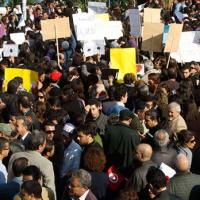
"Bardo 1" gives a new expression to persistent anger
As a new political crisis is looming over the formation of the government in Tunisia, a tide of protests is beginning to emerge in the country. The flood of strike actions and other social protests since the elections has been endless. ‘Bardo’ Square, facing the building which houses the newly elected Constituent Assembly, has been where all the anger and social and political demands of Tunisian people have been concentrating for several days now.
Since last Wednesday, thousands of “sit-inners” have gathered to air their grievances, some camping with tents on the square for several nights. They include unemployed people from the mining town of Gafsa demanding jobs, students from the UGET (student union) and teachers protesting against the recent actions of religious fanatics in their universities, women fighting to defend their rights, workers on strike from the Monastir airport demanding support for their cause, parents of the revolution’s martyrs demanding justice over their children, left organisations and civil rights associations and many others.
Occupation in Bardo square
Some are just fed up with promises and do not trust the new politicians to solve their economic problems. A young unemployed man simply stated he was at Bardo “because I want a job to feed my family”. The job situation is getting worse by the day, and even official economic reports recently released, such as the one from the Tunisian Central Bank, confirm that the economic perspective is for negative growth and a steady rise in an already appalling level of unemployment.
Others are angry at the new powers that the dominant Islamist party, Ennahda, is planning to accrue, fearing a return to dictatorship. Ennahda, with 89 seats in the assembly, has sought to concentrate an incredible number of powers in the hands of the expected new Prime minister – the party’s number two, Hamadi Jebali.

Fears have also been triggered following the release of draft laws, in particular one which says a motion of confidence against the new government would need a 2/3 majority. In parctice this would give the possibility for Ennahdha, which dominates the assembly with 42% of the seats, to block any vote of confidence at all. This has been justifiably denounced by many protesters as an attempt at a ‘constitutional coup’. It is a direct result of the new ruling party to have a majority solid enough to allay the concerns of foreign investors and major capitalist countries about continuous unrest in the country and the potential political consequences that such a situation can generate in the coming period.
On Thursday, the sit-in at Bardo Square was also joined by a large number of university professors and staff, who answered massively the call for a general strike in all institutions of higher education on that day made by the General Federation of Higher Education and Scientific Research (party of the main UGTT federation). This strike came as a response to the rising number of attacks committed by hard-line Salafist groups in universities especially. Last Monday, a group of Salafists disrupted classes at the University of Letters, Arts, and Humanities in Manouba (West of Tunis), demanding an end to mixed-sex classes and for female students to wear the niqab (full face veil). The Salafists took hostage the Dean of the University as well as several other teachers.
Potential for mass struggle comes with new dangers
Some have called the new sit-in “Bardo 1”. This is a reference to the name given to the two prolonged sit-ins at Kasbah Square called “Kasbah 1” and “Kasbah 2” which took place earlier in the year and which brought down the transitional government of Mohammed Ghannouchi.
However, if similarities exist, some differences are also noticeable. Above all, the social composition of “Bardo 1” is more mixed, bringing in also more well-off, middle class and liberal layers, whose simple motivation is to protest against ‘political Islam’ and to protect secularism. They do not have any real interest in the social issues that are the primary concerns of the majority in society, including in the ranks of Ennahda’s voters.
On Saturday a 3,000-strong counter-protest was organised by Islamist and Ennahda supporters in reaction to the initial protests. This is a warning of the dangers lying ahead if a clear, class perspective is not given to the deep frustration that exists in society.

’Bardo 1’ demonstrators face off with Islamist counter-demo
Apart from ordinary Ennahda voters and sympathisers demonstrating peacefully, there were quite a number of alienated and manipulated young people – some probably paid to turn out on this counter-demo. The right-wing fundamentalist group ‘Hizb ut-Tahrir’ and other Salafist thugs used the opportunity to engage in a demonstration of force against the initial Bardo protesters. A tense “face-to-face” situation, with a cordon of police in between the two groups, lasted for hours. Tensions built up until late in the day, before some of the fundamentalists started to provoke clashes, throwing stones and empty bottles at the outnumbered protesters, injuring several of them in the process. Similar religious extremist groups had already been reported physically assaulting protesting campers on previous nights.

A woman bleeding from a Salafist attack
This highlights the dangerous polarisation that could develop in Tunisia if the underlying social discontent are not channeled into a political expression. A united class struggle needs to be developed. The main fight must be against poverty, unemployment and corruption, against the remnants of the dictatorship, for democratic and women’s rights, for a popular trial of the martyrs’ killers etc. These are all questions that can give common ground for united action and for building the unity of workers, young people and the poor against their common, capitalist enemy, whatever political cover this system adopts in order to perpetuate its exploitation and continued rule.
More extensive reports and analysis of these events will follow on Socialistworld.net.

Be the first to comment